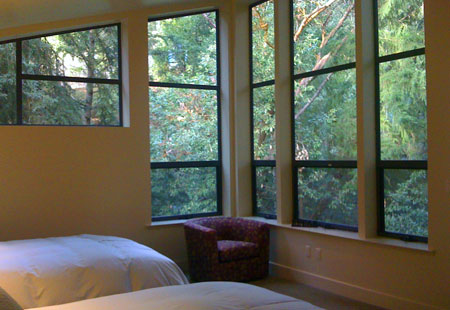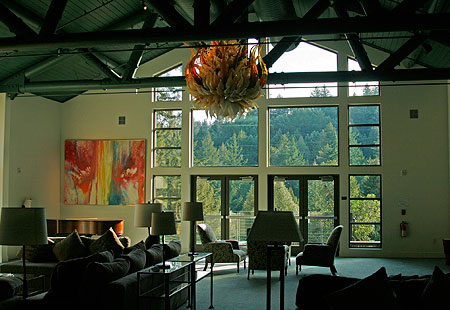In Talking Points Memo, there was an article about gun vs. non-gun culture. It touched on a story about a couple of 22-year-old men who decided to “educate” people in a neighborhood in Portland, Oregon unused to seeing guns by openly carrying assault weapons through the town. The sight of two young men carrying assault weapons down peaceful suburban streets generated a rash of 911 calls from frightened residents, and sent at least one school into lockdown—this coming less than a month after the Newtown incident. Neither man was arrested because they had “concealed handgun licenses,” though how this covered the open display of assault rifles escapes me. Their purpose was, purportedly, to demonstrate their Second Amendment rights, and seemed unconcerned that they were upsetting people.
Josh Marshall wrote a piece on the incident, naturally not painting the two young men in the best light. Someone wrote to Marshall about how his story on the incident rankled them; they felt it was a slanted piece that demonized gun owners:
My point is that regardless of how we feel about the law, that it was legal for them to do what they did but the tone I read was illustrating criminal behavior. I liken it to people obnoxiously purposely coughing and giving the stink eye to others who are smoking outside, well away from a door, in an allowed smoking area. Obviously less severe but an example of frankly, being pissy about others’ non criminal choices.
To say that Marshall’s story is like a non-smoker finding people smoking in their designated area and coughing obnoxiously as a means of objection is pretty far off the mark. In this case in particular, the two young Oregonians were not like smokers enjoying a drag outside and away from doors. That would be like gun owners shooting at a gun range, not 22-year-olds walking down residential streets with assault rifles. They were the ones going out of their way to be pissy about other’s attitudes about guns. Smokers in a designated smoking area are not “educating” others about smoking rights, or anything else.
This brought to mind a rather interesting comparison, because I do see similarities in attitudes between the two cultures, pro-gun and pro-smoking: the sense that smokers and gun owners can assert their freedoms without regard for the rights or concerns of others; the sense that people who object to this are being unreasonable; and a cultural sense of resentment at being persecuted, marked by a conflation of rash impositions and reasonable objections. A great deal of this has to do with perceptions, as well as with what one considers a normal or neutral state of affairs—what I call the “neutral space.”
The reaction of the pro-gun reader to Marshall’s objections to the Oregon story was starkly indicative of the difference in perception: what is the natural or neutral state of things? For smokers and gun owners, it seems to be, “I get to do my thing wherever I want and you just have to be cool with that.” The more militant smokers are like this; they do not see a space where no one is doing anything as a fair and neutral starting point; they see a room where they are smoking as a fair and neutral starting point, from which any objection you make is an imposition upon them which crosses the line of fairness. Secondhand smoke, to them, is little different from clear air, at least in the context of what one can fairly expect and have no objection to. To them, secondhand smoke is a non-issue; to the non-smoker, it is the entire issue.
The more militant gun owners, in this sense, are the same way: a fair and neutral starting point is that I get to have guns and carry them around, and you just have to be cool with that. Anything less free than that concerning gun “keeping and bearing” is an unfair imposition on them. For these people, your rights and concerns about safety are a non-issue; they may as well simply not exist. The non-gun person, however, has this threat to their safety, and the safety of their children and others around them, suddenly thrust upon them in the form of seeing an unknown person bearing a weapon designed to kill people entering their space. They may not react well to being told that there is nothing they can do about this.
The second similarity, stemming from this, is the perception of who is being unreasonable when there is a conflict. The concept of the neutral space is at the root of this. In smoking culture, since “doing what you want” is considered the neutral space, someone who demands to breathe clean air is being unreasonable. The smoker does not see their act as an invasive one, so when they are told to stop smoking, they see that as the invasive act. You are butting into my business.
I may be biased about this myself, but I cannot see how that attitude is reasonable. If you and I are in a confined space, the social norm is that we do not carry out any act which imposes on the other. Or perhaps stated more pertinently, we do not carry out the initial act of imposition. If we are in a doctor’s waiting room, and I start making annoying noises and you ask me to stop, who is imposing upon whom first? If we are sitting in adjacent seats on an airplane, and I keep shifting around so my arms and side keep nudging and brushing against you and you ask me to stop, who is being unreasonable? If we are in an elevator and I let rip a particularly gruesome fart and you give me a dirty look, do I have the right to be offended?
In the smoking context, smokers—at least the militant ones—do not see what they do as the initial act of imposition; they see their actions as a natural right which others are required to accept as the normal state of affairs. They ignore the initial neutral space, they disregard the fact that they are imposing an unpleasantness on others first, and are annoyed when they are asked to stop.
So it is with the militant gun owners. They ignore the clear context of militia in regards to the entire Second Amendment “keep and bear arms” right, and literally read it as a right to not just possess weapons, but to carry them wherever they damn well please. Thus we have two men in Oregon who believe that they are doing a public service when, just weeks after the entire nation is horrified by a young man bearing an assault rifle killing 20 young children, they themselves bear the same or similar weapons and walk past residential homes and schools. They felt that they were making an important statement about their freedoms; they did not see the context or viewpoints of others as being relevant.
The neutral space—one which assumes a right to keep and bear arms—is one where arms are normally kept safe and locked up at home or other establishments, and used in specific contexts in designated areas. Not to walk around scaring the living crap out of parents soon after a severe national trauma.
The third similarity is a perception of resentment and sense of persecution from within the “using” cultures, who focus, often markedly, how put-upon they are. There is the tendency to superimpose the most egregious of objections made by critics onto every instance of criticism, no matter how subdued or polite.
As an example of this in smoking culture, I recall one job I had at a language school in Japan where the common teaching area was smoke-free, but the common teachers’ preparation area was not smoke-free. Between every lesson I was constantly subjected to 10 or 20 minutes of heavy cigarette smoke. Appealing to management was unproductive: they were all smokers as well. I didn’t even want to ban smoking; all I wanted was one table within the room where smokers would not puff away so we non-smokers could at least have a mild refuge from the worst of the smoke. The boss unhelpfully told me I could get this, but only if every smoker in the office agreed. I started by asking one of the smokers this, someone I had never confronted or complained to. I sat down and explained to him that the smoke was a difficulty professionally for me, as I had to speak all day, and between lessons, the smoke was making my throat raw. I asked politely (and those who know me in an office context know that my default mode is to be deferential and polite) if he would agree, and that he would decide himself which table could be smoke-free, just one of five or six tables in the room. He smiled, exhaled a long, leisurely stream of smoke, and said, “Fuck off.” It was pretty clear that he was enjoying retribution, not against me, but against everyone who he felt had annoyed him about his habit or had kept him from enjoying it where he pleased.
Gun owners seem to have the same sense of persecution, and indulge in the same general reaction to any objections from others. I see it when I debate guns with them, in which I support the right to keep and bear arms but debate whether the right stems from the second or the ninth amendment, and they react as if I think there is no right to keep and bear arms at all; or when I suggest gun control measures, making clear that under such measures, people could still have houses filled with guns, but they instantly assume I am promoting gun bans and confiscation—no matter how clearly I state otherwise. I sense they are not confronting my arguments, that in fact, they may not even be paying much attention to what I am saying at all, but instead feel that they are debating everyone who they felt had infringed on their rights; that whomever suggests any restrictions on guns may as well be the same person who wants to ban guns. The conflation in the Talking Points Memo story of the Oregon men (armed with assault rifles walking by homes and schools in the wake of a mass school shooting) with smokers (trying to get a brief break in a remote and restricted area and yet still being accosted by asinine non-smokers) is an excellent example of this.
It might even be that the gun “enthusiasts,” who now possess incredible freedoms compared to cigarette smokers, see similarities between smoking and guns as well—in that they fear guns will be treated as smoking is treated, where the practice in question will be demonized, those indulging will be seen as pariahs, and the enjoyment of their favorite pastime will be restricted to spaces away from others.





















